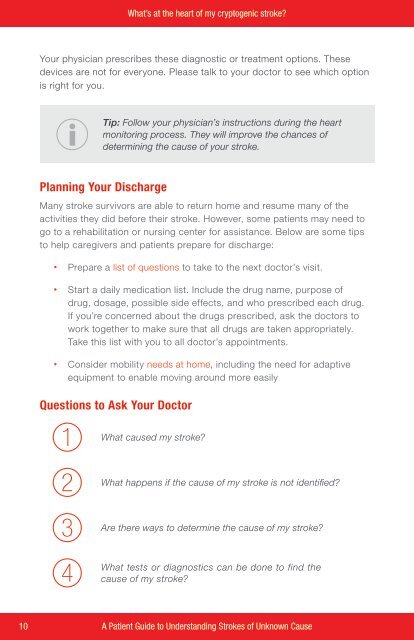my cryptogenic stroke?
6018BKb2Y
6018BKb2Y
- No tags were found...
You also want an ePaper? Increase the reach of your titles
YUMPU automatically turns print PDFs into web optimized ePapers that Google loves.
What’s at the heart of <strong>my</strong> <strong>cryptogenic</strong> <strong>stroke</strong>?<br />
What’s at the heart of <strong>my</strong> <strong>cryptogenic</strong> <strong>stroke</strong>?<br />
Your physician prescribes these diagnostic or treatment options. These<br />
devices are not for everyone. Please talk to your doctor to see which option<br />
is right for you.<br />
Planning Your Discharge<br />
Many <strong>stroke</strong> survivors are able to return home and resume many of the<br />
activities they did before their <strong>stroke</strong>. However, some patients may need to<br />
go to a rehabilitation or nursing center for assistance. Below are some tips<br />
to help caregivers and patients prepare for discharge:<br />
∙∙<br />
∙∙<br />
∙∙<br />
Tip: Follow your physician’s instructions during the heart<br />
monitoring process. They will improve the chances of<br />
determining the cause of your <strong>stroke</strong>.<br />
Prepare a list of questions to take to the next doctor’s visit.<br />
Start a daily medication list. Include the drug name, purpose of<br />
drug, dosage, possible side effects, and who prescribed each drug.<br />
If you’re concerned about the drugs prescribed, ask the doctors to<br />
work together to make sure that all drugs are taken appropriately.<br />
Take this list with you to all doctor’s appointments.<br />
Consider mobility needs at home, including the need for adaptive<br />
equipment to enable moving around more easily<br />
Questions to Ask Your Doctor<br />
What caused <strong>my</strong> <strong>stroke</strong>?<br />
What happens if the cause of <strong>my</strong> <strong>stroke</strong> is not identified?<br />
Are there ways to determine the cause of <strong>my</strong> <strong>stroke</strong>?<br />
What tests or diagnostics can be done to find the<br />
cause of <strong>my</strong> <strong>stroke</strong>?<br />
How is <strong>cryptogenic</strong> <strong>stroke</strong> treated?<br />
(Treatment may vary per patient)<br />
Is <strong>cryptogenic</strong> <strong>stroke</strong> typically hereditary?<br />
For patients who received a home heart-monitoring device<br />
(either insertable or external):<br />
What is the purpose of <strong>my</strong> monitoring device?<br />
How long can I wear it?<br />
How will it impact <strong>my</strong> daily activities?<br />
What can I do to minimize <strong>my</strong> risk of having another <strong>stroke</strong>?<br />
What should I share with <strong>my</strong> PCP or neurologist about <strong>my</strong><br />
<strong>cryptogenic</strong> <strong>stroke</strong> once I am recovering at home?<br />
Tip: Throughout the recovery process, it’s important to<br />
either be your own advocate or assist your loved ones to<br />
ensure they’re getting the information they need.<br />
Minimizing Your Risk of Another Stroke<br />
While the cause of your <strong>stroke</strong> may not yet be determined, it is important<br />
to follow your physician’s medical advice and take your medications. If you<br />
receive a heart monitoring device, you will also want to follow any heart<br />
monitoring regimens prescribed.<br />
Additionally, you may reduce your risk factors for <strong>stroke</strong> by following a healthy<br />
lifestyle. Here are 7 behaviors AHA has identified, called Life’s Simple 7 ® , to<br />
help you minimize the risk of another <strong>stroke</strong> event.<br />
1. Manage Blood Pressure<br />
High blood pressure is a major risk factor for heart<br />
disease and <strong>stroke</strong>. When your blood pressure stays<br />
within healthy ranges, you reduce the strain on your<br />
heart, arteries, and kidneys, which helps keep you<br />
healthier longer. You can manage high blood pressure<br />
by taking prescribed medication from your physician<br />
and managing your sodium.<br />
10 A Patient Guide to Understanding Strokes of Unknown Cause<br />
A Patient Guide to Understanding Strokes of Undetermined Cause<br />
11


